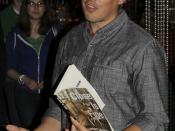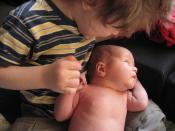The modernist period lies between 1900-1950, a time of great progress in art, architecture, music and literature. Modernism, the genre that was associated with this period, featured radical aesthetics, technical experimentation, self-conscious reflexiveness and skepticism of the real world. Modernism was a direct response to such events like the Russian Revolution, the industrial revolution, technological change, World War 1 and the depression. Industrialization brought about the machines and buildings of cast iron, offering a radically different urban life. Darwin's theory of natural selection and Freud's view of subjective states that involved an unconscious mind full of primal impulses shocked the Victorians. And as the names of Darwin and Freud suggest, it was the intellectuals and upper class that became part of the modernist age. Among these artists was T.S. Eliot. Eliot's concerns deeply showed the affect of WWI on the moral values of people and people's belief in God.
Industrialization drastically increased production and consumption rates, with that so did pollution, creating a very ugly metropolis. In response to this industry, there was an increase in urbanization as more people wanted to move closer to work and money, hence the sense of crowdedness in Eliot's poems. Influxes of human population meant more pollution. The Depression played an important part in developing the persona of the modern man. This was a time of decline in a man's dignity and much humiliation from not being able to fend for his family.
One of the prime concerns that characterized Modernist texts was the depiction of the cityscape as the habitat of the modern man. The Industrial revolution significantly transformed the urbanity of England, supplying the streets with cheap electricity and extending the city horizons to include skyscrapers and railroad bridges of cast iron. Eliot's main concern revolved around the impact of such...


